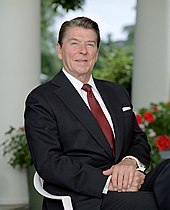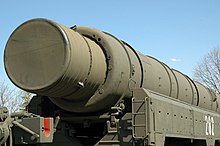Drafts for a third diary
Drafts for a third diary is a work by Max Frisch , which appeared posthumously in 2010 . In terms of content and style, it ties in with his story Montauk from 1975.
content
The drafts for a third diary contain several narrative strands, which are put together in short, essayistic sections. One motif that runs through the entire book is the confrontation with the United States , especially with the attitude during the Cold War and the arms race. Again and again one can feel the alienation, the dismay, and also the anger over the conviction of many Americans that their country has a kind of judge's role and the task of dominating the entire world political affairs according to its standards: “[…] they feel as the best kind of people there can be, and therefore they cannot stand criticism of America even within an alliance, since they are undoubtedly the stronger in this alliance, so they know better ... "
Alice Locke-Carey, Lynn from Montauk , with whom Max Frisch was still living at the time the work was created, also misses this lack of depth . The reflections on this sometimes difficult relationship are often combined with another topic in the book, the examination of aging: “My pleasure in this woman, even if she occasionally loses grace and her patience with me, my patience out of understanding That it is difficult for her, for example when the young men walk on the beach, my serene affection even when I miss one thing or the other on my part, when I'm alienated as a European, when she only knows Tolstoy from a film and Shakespeare hardly and when she is basically indifferent to questions that move me, so that the conversation does not start - this almost unconditional pleasure (gratitude for her presence) is a sign of advanced senility. "
Aging and death, the latter especially in the intensive examination of the death of his friend Peter Noll , which is in the foreground in the first part of the book, are central motifs in the drafts . They are treated very differently. While Frisch on the one hand repeatedly noticed a decline in interest in the world, the increasing number of deaths among his friends as well as boredom and failures at work, on the other hand he also found again and again that skills that are important to him have not yet been lost: sailing After a short period of acclimatization, a Sunfish in the Caribbean succeeds as always, the renovation of the house in Berzona in the Valle Onsernone is proof of the expectation of not being alone there. The architect Frisch, who barely built in his life, enjoys playful dreams of a retirement home with numerous guest rooms and amenities for visitors, but also enough retreats for his contemplative existence. Peter von Matt describes this vision as “compelling” and complains that “the project of the third diary was just canceled here.” According to von Matt, this “hurts” .
History of the typescript
Max Frisch dictated the drafts for a third diary to his secretary Rosemarie Primault, presumably between spring and November 1982, partly by telephone, partly on tape. Primault handed over the received copy - a personal copy that Max Frisch used to give the funeral oration for Peter Noll, for example, no longer exists - presumably in 2001 to the Max Frisch Archive. Although various people must have known that Frisch had written these drafts - among others, Frisch's biographer Volker Hage had visited the author in September 1982 and received one of the episodes that appear in the drafts from him , and his translators Evgenija Kaceva and Geoffrey Skelton was hoping for a publication of the work - it was considered a surprise when the 184 unpaginated but apparently ordered pages were rediscovered in the archive in the summer of 2009. Despite the objection from Rosemarie Primault and Walter Obschlager , who had headed the archive until 2008, the Board of Trustees of the Max Frisch Foundation decided to publish the work. As it appeared to have a fragmentary character, the title that was to be read on the cover sheet was not chosen:
DIARY 3
_____________
From spring 1982
Dedication: To Alice
New York, November 1982.
Peter von Matt provided the issue with an afterword, an editor's report and a few comments.
Biographical classification and influences
At the time the designs were created , Max Frisch lived with Alice Locke-Carey temporarily in a loft in 123 Prince Street, New York , which he had bought on April 30, 1981 and sold again in 1984, at times also in Berzona. He had met Alice Locke-Carey in 1974 and met again in 1980. The relationship lasted from 1980 to spring 1983; On April 20, 1983, Frisch noted in an agenda that it was over.
In December 1981 he learned that his friend Peter Noll had developed bladder cancer and refused surgical treatment. At his request to keep a kind of log book about the death , Noll explained that he had already started. Frisch received the individual parts of the manuscript for the dictations on dying and death , which were published in 1984, promptly. He made one last trip to Egypt with Noll, which had to be broken off prematurely because of Noll's illness. He kept his promise to give the funeral oration for his friend on October 18, 1982 in the Grossmünster in Zurich .
In 1981, Ronald Reagan was sworn in as President of the United States . The Reagan era was marked by the abandonment of détente and nuclear armament. Reagan also imposed sanctions on Poland , where Lech Wałęsa was interned until November 1982. In a speech on February 6, 1982, under the impression of the events in Poland, Susan Sontag equated communism with fascism , which led to intense debates and also moved Frisch.
On April 2, 1982, with the occupation of the Falkland Islands by Argentina, the conflict between Argentina and Great Britain began, which led to the costly Falklands War .
In June 1982, marched Israel in Lebanon in order the PLO off. After the murder of the Maronite President Bachir Gemayel , massacres took place in Palestinian refugee camps.
In 1982 Jonathan Schell's book The Fate of Earth was published , in which he made a gloomy forecast for the future of the earth. Frisch read the book with interest, but also with doubts. In 1982 the term " HIV " hit the headlines, which prompted Frisch to make a brief statement:
"THANATOS AND EROS
in America means:
CASUAL SEX."
reception
The review of Judith von Sternburg's drafts in the Frankfurter Rundschau was somewhat undecided . Above all, she emphasized the pavement of the Board of Trustees back and forth and the conflict between the editor Peter von Matt and Adolf Muschg , who wanted to prevent the book from appearing, as well as the question of the extent to which this third diary remained a fragment. Overall, however, von Sternburg has a rather positive view of the book: “The journey through time shows a writer who has become critically and self-critically old, but also famous. The fact that you knew this beforehand doesn’t take away any of its charm from reading it […] A lot of things sparkle, for example the fabulous Thanksgiving scene […] The fact that Frisch is also a keen (newspaper-reader!) Observer of politics makes the drafts a panorama at the same time the by no means theoretical fear of nuclear war. "
Lothar Müller wrote in the Süddeutsche Zeitung : “It is always worth reading […] where it is not looking for timelessness. But that which has lapsed in time, and not as a concept, but as an intuition. The peculiar interplay of images that concludes these recordings is therefore remembered more strongly than the reflections on aging. [...] In the end, the author seems to disappear into this villa, of which he dreams and which he makes painting the veranda his most urgent task. The letters to the editor, for which he specially dreamed up a mailbox, can now come. "
In the FAZ , Wolfgang Schneider protested against, among other things, Peter von Matt's strangely aloof attitude to the spirit of life and the fears of the 1980s, which are so vividly revealed in the book: “It is therefore hardly surprising that […] the zeitgeist of the early eighties Years reflected in the diary: nuclear panic. However, nothing is forgotten so quickly as the end of the world, which did not take place. While the apocalyptic mood of the years before 1914 seems very appropriate in retrospect, the collective fears of the eighties were refuted by the unexpectedly constructive course of history. Today the subject is so remote that Frisch's remarks seem almost embarrassing to the editor, Peter von Matt: “Even if you have been politically awake in the early 1980s, you are surprised by the vehement feeling of an imminent nuclear war and the possible annihilation of all humanity . " Apparently von Matt was not one of the millions who went to peace demonstrations in Europe at the time. Or to the seven hundred thousand who - freshly in the middle - protested in Central Park and thought the nuclear war (possibly triggered by a computer breakdown) was only a matter of time. "
Schneider ascribes the drafts “not only moderate and unfinished, but also carefully edited and condensed texts” and “large passages” . All in all, he is very impressed with the work and rightly emphasizes that non-publication would hardly have been feasible in the long term.
Book edition
- Drafts for a third diary . Edited and with an afterword by Peter von Matt . Suhrkamp, Berlin 2010, ISBN 978-3-518-42130-7 .
Individual evidence
- ↑ Max Frisch, Drafts for a Third Diary , p. 9.
- ↑ Max Frisch, Drafts for a Third Diary , pp. 152f.
- ↑ Peter von Matt, afterword . In: Max Frisch, drafts for a third diary , pp. 185–197, here p. 197.
- ↑ Peter von Matt, editor's report . In: Max Frisch, Drafts for a Third Diary , pp. 198–203.
- ↑ Max Frisch, Drafts for a Third Diary , pp. 205 f.
- ↑ Max Frisch, Drafts for a Third Diary , p. 53.
- ↑ https://www.fr.de/kultur/literatur/langweilt-mich-jeder-satz-11684664.html
- ↑ http://www.buecher.de/shop/buecher/entwuerfe-zu-einem-dritten-tagebuch/frisch-max/products_products/content/prod_id/27942384/#sz
- ↑ Impotence cannot be relied on either , review in the FAZ on April 10, 2010

